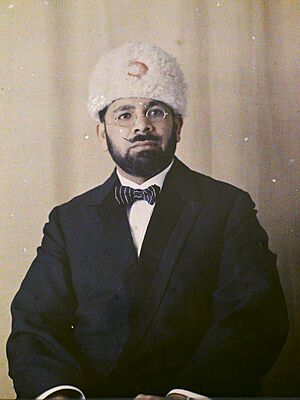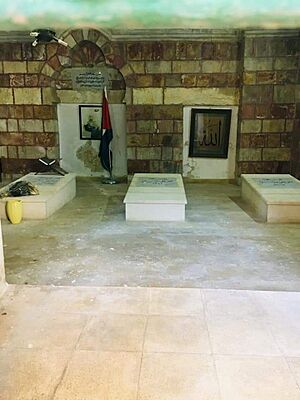Mohammad Ali Jauhar facts for kids
Quick facts for kids
Muhammad Ali Jauhar
|
|
|---|---|

Autochrome portrait by Auguste Léon, 1920
|
|
| 10th President of All-India Muslim League | |
| In office 30 December 1917 – 1 January 1918 |
|
| Preceded by | Muhammad Ali Jinnah |
| Succeeded by | Mohammad Ali Mohammad Khan |
| 41st President of Indian National Congress | |
| In office 1923–1923 |
|
| Preceded by | Chittaranjan Das |
| Succeeded by | Abul Kalam Azad |
| Personal details | |
| Born | 10 December 1878 Rampur, Rampur State, British India |
| Died | 4 January 1931 (aged 52) London, England |
| Resting place | Jerusalem |
| Political party | All India Muslim League |
| Other political affiliations |
Indian National Congress |
| Spouse |
Amjadi Bano Begum
(m. 1902–1931) |
| Relations | Shaukat Ali (brother) |
| Parents | Abdul Ali Khan (father) Abadi Bano Begum (mother) |
| Occupation | Journalist, scholar, political activist, poet |
| Known for | Khilafat movement |
| Religion | Islam |
| Founder of | Jamia Millia Islamia |
Mohammad Ali Jauhar (born December 10, 1878 – died January 4, 1931) was an important Indian Muslim leader. He was a freedom fighter, a talented journalist, and a poet. He played a big role in the Khilafat Movement and helped start Jamia Millia Islamia, a famous university.
Jauhar was also a member of the Indian National Congress and later became its President in 1923. However, he soon had disagreements with the party, especially with Mahatma Gandhi. He felt that the Congress was not doing enough to support Muslim demands. He then became a key figure and the 10th president of the All-India Muslim League. He represented the Muslim League at an important meeting in London.
Contents
Early Life and Education
Mohammad Ali was born in 1878 in Rampur, which was part of British India at the time. His family was wealthy. Sadly, his father, Abdul Ali Khan, passed away when Mohammad Ali was only five years old.
His mother, Abadi Bano Begum, was a very strong and inspiring woman. She made sure her sons, including Mohammad Ali and his brother Shaukat Ali, received a good education. She wanted them to fight for India's freedom from British rule.
Thanks to his mother's efforts, Mohammad Ali Jauhar studied at Aligarh Muslim University and Allahabad University in India. Later, in 1898, he went to England and studied history at Lincoln College, Oxford.
A Voice for Change: His Newspapers
After returning to India, Jauhar worked for a short time in government jobs. But he soon became a well-known writer and speaker. He wrote articles for major newspapers in both Britain and India.
In 1911, he started his own English weekly newspaper called The Comrade in Calcutta. This newspaper quickly became popular and had a lot of influence. In 1912, he moved to Delhi and started an Urdu-language daily newspaper called Hamdard in 1913. These newspapers were important tools for sharing his ideas about freedom and justice.
In 1902, he married Amjadi Bano Begum. She also actively supported the freedom movement alongside him. Jauhar also worked hard to improve Aligarh Muslim University. In 1920, he helped found Jamia Millia Islamia, which later moved to Delhi and became a very important university.
Fighting for Freedom: The Khilafat Movement
Mohammad Ali Jauhar was involved in politics from an early age. He attended the first meeting of the All India Muslim League in 1906 and later became its president in 1918. He was a leader in three major political groups in India: the Indian National Congress, the All India Muslim League, and the Khilafat Movement.
In 1919, Jauhar was part of a group that went to England. They wanted to convince the British government not to remove the Sultan of Turkey, who was seen as the leader of all Muslims at that time. When their requests were not met, it led to the start of the Khilafat Movement in India. This movement encouraged Muslims across India to protest against the British government.
In 1921, Jauhar worked with other important leaders like Shaukat Ali, Abul Kalam Azad, and Mahatma Gandhi. Gandhi helped get the support of the Indian National Congress and many Hindus. This brought Muslims and Hindus together to protest against the British government. Jauhar strongly supported Gandhi's call for peaceful protests and strikes. Because of his powerful speeches, British authorities arrested him and put him in jail for two years.
Disagreements with the Congress Party
Mohammad Ali Jauhar became disappointed when the Khilafat Movement ended. He was also upset when Gandhi stopped the non-cooperation movement in 1922. This happened after a violent event where protesters clashed with police.
After this, Jauhar restarted his newspaper Hamdard and left the Congress Party. He disagreed with the Nehru Report, a plan for India's future government. He felt it did not fully address the needs of Muslims. Instead, he supported the Fourteen Points proposed by Muhammad Ali Jinnah and the Muslim League, which aimed to protect Muslim rights. He became a critic of Gandhi and other Muslim leaders who continued to support the Congress.
Imprisonment and Later Years
Mohammad Ali Jauhar was often arrested and jailed by the British government for his activities against their rule. In 1921, he was sentenced to two and a half years in Karachi central jail. Despite these challenges, he continued to fight for the rights of Muslims and the Muslim League.
His frequent jail sentences, along with his diabetes and poor nutrition, made him very ill. Even with his failing health, he insisted on attending the first Round Table Conference in London in 1930. He wanted to make sure the Muslim League's voice was heard. He famously told the British government that he would not return to India alive unless the country was free. He said he would rather die in a free country, even if it was a foreign one.
Death and Legacy
Mohammad Ali Jauhar passed away from a stroke in London on January 4, 1931. His family and friends chose to bury him in Jerusalem. His grave is near the Dome of the Rock, and the inscription on it reads: "Here lies al-Sayyid Muhammad Ali al-Hindi."
His contributions are remembered in many ways. In 1978, Pakistan Postal Services issued a special postage stamp in his honor. Many places and institutions are named after him, including Mohammad Ali Jauhar University in India and Johar Town in Pakistan.
Mohammad Ali Jauhar believed in unity. In a speech in 1923, he spoke about his dream of a "Federation of Faiths" in India, where different religions could live together peacefully. However, later in his life, he began to support the idea of a separate nation for Muslims, which became the Pakistan Movement.
 | Aaron Henry |
 | T. R. M. Howard |
 | Jesse Jackson |


